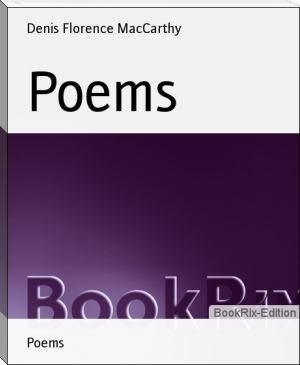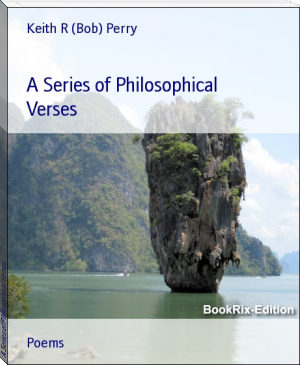Poems - Denis Florence MacCarthy (good books to read .txt) 📗

- Author: Denis Florence MacCarthy
Book online «Poems - Denis Florence MacCarthy (good books to read .txt) 📗». Author Denis Florence MacCarthy
PREFACE.
This volume contains, besides the poems published in 1850 and 1857,[1] the odes written for the centenary celebrations in honour of O'Connell in 1875, and of Moore in 1879. To these are added several sonnets and miscellaneous poems now first collected, and the episode of "Ferdiah" translated from the 'Tain Bo Chuailgne.'
Born in Dublin,[2] May 26th, 1817, my father, while still very young, showed a decided taste for literature. The course of his boyish reading is indicated in his "Lament." Some verses from his pen, headed "My Wishes," appeared in the "Dublin Satirist," April 12th, 1834. This was, as far as I can discover, the earliest of his writings published. To the journal just mentioned he frequently contributed, both in prose and verse, during the next two years. The following are some of the titles:-"The Greenwood Hill;" "Songs of other Days" (Belshazzar's Feast-Thoughts in the Holy Land-Thoughts of the Past); "Life," "Death," "Fables" (The Zephyr and the Sensitive Plant-The Tulip and the Rose-The Bee and the Rose); "Songs of Birds" (Nightingale-Eagle-Phoenix-Fire-fly); "Songs of the Winds," &c.
On October 14th, 1843, his first contribution ("Proclamation Songs," No. 1) appeared in the Dublin "Nation." "Here is a song by a new recruit," wrote Mr., now Sir, Charles Gavan Duffy, "which we should give in our leading columns if they were not preoccupied." In the next number I find "The Battle of Clontarf," with this editorial note: "'Desmond' is entitled to be enrolled in our national brigade." "A Dream" soon follows; and at intervals, between this date and 1849-besides many other poems-all the National songs and most of the Ballads included in this volume. In April, 1847, "The Bell-Founder" and "The Foray of Con O'Donnell" appeared in the "University Magazine," in which "Waiting for the May," "The Bridal of the Year," and "The Voyage of Saint Brendan," were subsequently published (in January and May, 1848). Meanwhile, in 1846, the year in which he was called to the bar, he edited the "Poets and Dramatists of Ireland," with an introduction, which evinced considerable reading, on the early religion and literature of the Irish people. In the same year he also edited the "Book of Irish Ballads," to which he prefixed an introduction on ballad poetry. This volume was republished with additions and a preface in 1869. In 1853, the poems afterwards published under the title of "Underglimpses" were chiefly written.[3]
The plays of Calderon-thoroughly national in form and matter-have met with but scant appreciation from foreigners. Yet we find his genius recognized in unexpected quarters, Goethe and Shelley uniting with Augustus Schlegel and Archbishop Trench to pay him homage. My father was, I think, first led to the study of Calderon by Shelley's glowing eulogy of the poet ("Essays," vol. ii., p. 274, and elsewhere). The first of his translations was published in 1853, the last twenty years later. They consist[4] of fifteen complete plays, which I believe to be the largest amount of translated verse by any one author, that has ever appeared in English. Most of it is in the difficult assonant or vowel rhyme, hardly ever previously attempted in our language. This may be a fitting place to cite a few testimonies as to the execution of the work. Longfellow, whom I have myself heard speak of the "Autos" in a way that showed how deeply he had studied them in the original, wrote, in 1857: "You are doing this work admirably, and seem to gain new strength and sweetness as you go on. It seems as if Calderon himself were behind you whispering and suggesting. And what better work could you do in your bright hours or in your dark hours that just this, which seems to have been put providentially into your hands." Again, in 1862: "Your new work in the vast and flowery fields of Calderon is, I think, admirable, and presents the old Spanish dramatist before the English reader in a very attractive light. Particularly in the most poetical passages you are excellent; as, for instance, in the fine description of the gerfalcon and the heron in 'El Mayor Encanto.' I hope you mean to add more and more, so as to make the translation as nearly complete as a single life will permit. It seems rather appalling to undertake the whole of so voluminous a writer; nevertheless, I hope you will do it. Having proved that you can, perhaps you ought to do it. This may be your appointed work. It is a noble one."[5] Ticknor ("History of Spanish Literature," new edition, vol. iii. p. 461) writes thus: "Calderon is a poet who, whenever he is translated, should have his very excesses and extravagances, both in thought and manner, fully reproduced, in order to give a faithful idea of what is grandest and most distinctive in his genius. Mr. MacCarthy has done this, I conceive, to a degree which I had previously supposed impossible. Nothing, I think, in the English language will give us so true an impression of what is most characteristic of the Spanish drama; perhaps I ought to say, of what is most characteristic of Spanish poetry generally."
Another eminent Hispaniologist (Mr. C. F. Bradford, of Boston) has spoken of the work in similar terms. His labours did not pass without recognition from the great dramatist's countrymen. He was elected a member of the Real Academia some years ago, and in 1881 this learned body presented him with the medal struck in commemoration of Calderon's bicentenary, "in token of their gratitude and their appreciation of his translations of the great poet's works."
In 1855, at the request of the Marchioness of Donegal, my father wrote the ode which was recited at the inauguration of the statue of her son, the Earl of Belfast. About the same time, his Lectures on Poetry were delivered at the Catholic University at the desire of Cardinal Newman. The Lectures on the Poets of Spain, and on the Dramatists of the Sixteenth Century, were delivered a few years later. In 1862 he published a curious bibliographical treatise on the "Memoires of the Marquis de Villars." In 1864 the ill-health of some of his family his leaving his home near Killiney Hill[6] to reside on the Continent. In 1872, "Shelley's Early Life" was published in London, where he had settled, attracted by the facilities for research which its great libraries offered. This biography gives an amusing account of the young poet's visit to Dublin in 1812, and some new details of his adventures and writings at this period. My father's admiration for Shelley was of long standing. At the age of seventeen he wrote some lines to the poet's memory, which appeared in the "Dublin Satirist" already mentioned, and an elaborate review of his poetry in an early number of the Nation. I have before alluded to Shelley's influence in directing his attention to Calderon. The centenary odes in honour of O'Connell and Moore were written, in 1875 and 1879, at the request of the committees which had charge of these celebrations. He returned to Ireland a few months before his death, which took place at Blackrock, near Dublin, on April 7th,[7] in the present year. His nature was most sensitive, but though it was his lot to suffer many sorrows, I never heard a complaint or and unkind word from his lips.
From what has been said it will be evident that this volume contains only a part of his poetical works, it having been found impossible to include the humorous pieces, parodies, and epigrams, without some acquaintance with which an imperfect idea would be formed of his genius. The same may be said of his numerous translations from various languages (exclusive of Calderon's plays). Of those published in 1850, "The Romance of Maleca," "Saint George's Knight," "The Christmas of the Foreign Child," and others have been frequently reprinted. He has since rendered from the Spanish poems by Juan de Pedraza, Antonio de Trueba, Garcilaso de la Vega, Gongora and "Fernan Caballero," whom he visited when in Spain shortly before her death, and whose prose story, "The Two Muleteers," he has also translated. To these must be added, besides several shorter ballads from Duran's Romancero General, "The Poem of the Cid," "The Romance of Gayferos," and "The Infanta of France." The last is a metrical tale of the fourteenth or fifteenth century, presenting analogies with the "Thousand and One Nights," and probably drawn from an Oriental source. His translations from the Latin, chiefly of mediaeval hymns, are also numerous.
In inserting the poem of "Ferdiah" I was influenced by its subject as well as by the wish of friends. A few extracts appeared in a magazine several years ago, and it was afterwards completed without any view to publication. It follows the present Irish text[8] as closely as the laws of metre will allow. Since these pages were in the printer's hands Mr. Aubrey de Vere has given to the world his treatment of the same theme,[9] adorning as usual all that he touches. As he well says: "It is not in the form of translation that an ancient Irish tale of any considerable length admits of being rendered in poetry. What is needed is to select from the original such portions as are at once the most essential to the story, and the most characteristic, reproducing them in a condensed form, and taking care that the necessary additions bring out the idea, and contain nothing that is not in the spirit of the original." (Preface, p. vii.) The "Tale of Troy Divine" owes its form, and we may never know how much of its tenderness and grace, to its Alexandrian editor. However, the present version may, from its very literalness, have and interest for some readers.
Many of the earlier poems here collected have been admirably rendered into French by the late M. Ernest de Chatelain.[10] The Moore Centenary Ode has been translated into Latin by the Rev. M. J. Blacker, M. A.
My thanks are due to the Rev. Matthew Russell, S. J., for his kind assistance in preparing this book for the press, and to the Publishers for the accuracy and speed with which it has been produced.
I cannot let pass this opportunity of expressing my gratitude for the self-sacrificing labours of the committee formed at the suggestion of Mr. William Lane Joynt, D. L., to honour my father's memory, and for the generous response his friends have made to their appeal.[11]
JOHN MAC CARTHY
Blackrock, Dublin, August, 1882.
1. "Ballads, Poems, and Lyrics, Original and Translated:" Dublin, 1850. "The Bell-Founder, and other Poems," "Underglimpses, and other Poems:" London, 1857. A few pieces which seemed not to be of abiding interest have been omitted.
2. At 24 Lower Sackville-street. The house, with others adjoining, was pulled down several years ago. Their site is now occupied by the Imperial Hotel.
3. The subjective view of nature developed in these Poems has been censured as remote from human interest. Yet a critic of deep insight, George Gilfillan, declares his special admiration for "the joyous, sunny, lark-like carols on May, almost worthy of Shelley, and such delicate, tender, Moore-like 'trifles' (shall I call them?) as 'All Fool's Day.' The whole" he adds, "is full of a beautiful poetic spirit,





Comments (0)